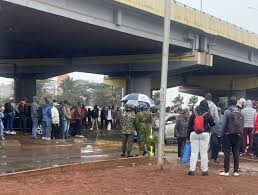Nairobi, Kenya’s capital, was on lockdown Monday as security forces shut down major roads and heightened patrols ahead of nationwide protests commemorating the 35th anniversary of the Saba Saba movement — the July 7 uprising that sparked Kenya’s shift toward multiparty democracy.
By dawn, the city centre was largely deserted. Businesses stayed closed, schools advised students to remain at home, and heavily armed police officers were stationed at key intersections. Checkpoints, some located over 10 kilometres from the city centre, left hundreds of commuters stranded amid tight security.
The government sealed off roads leading to critical institutions like the State House and Parliament with razor wire, citing efforts to preserve lives and maintain public order. In a statement on Sunday, the police reaffirmed their constitutional duty to ensure national security as tensions continue to rise.
Saba Saba — Swahili for “seven-seven” — marks the July 7, 1990, protests against the then one-party regime of President Daniel arap Moi. That uprising, which was violently suppressed and left at least 20 people dead, became a turning point in Kenya’s democratic history. Today, it stands as a symbol of resistance and civic activism.
This year’s protests have been driven by youth-led movements and civil society organisations, demanding improved governance, police accountability, and justice for victims of state violence. They follow a string of anti-government demonstrations that erupted last year over rising taxes and cost-of-living concerns.
The renewed unrest comes less than two weeks after deadly protests on June 25 left at least 19 people dead and thousands of businesses looted or destroyed. The government and activists continue to trade blame over the violence, with reports suggesting criminal gangs, commonly referred to as “goons,” infiltrated the protests to incite chaos. Civil society groups have accused the police of collusion — allegations strongly denied by law enforcement.
Tensions escalated further on Sunday when armed assailants stormed the offices of the Kenya Human Rights Commission in Nairobi, disrupting a press conference by women activists condemning state-sponsored violence.
As Kenyans mark Saba Saba’s 35th anniversary, the protests underscore ongoing struggles over repression, accountability, and citizens’ right to peaceful assembly — the same ideals that fuelled the original movement in 1990.









